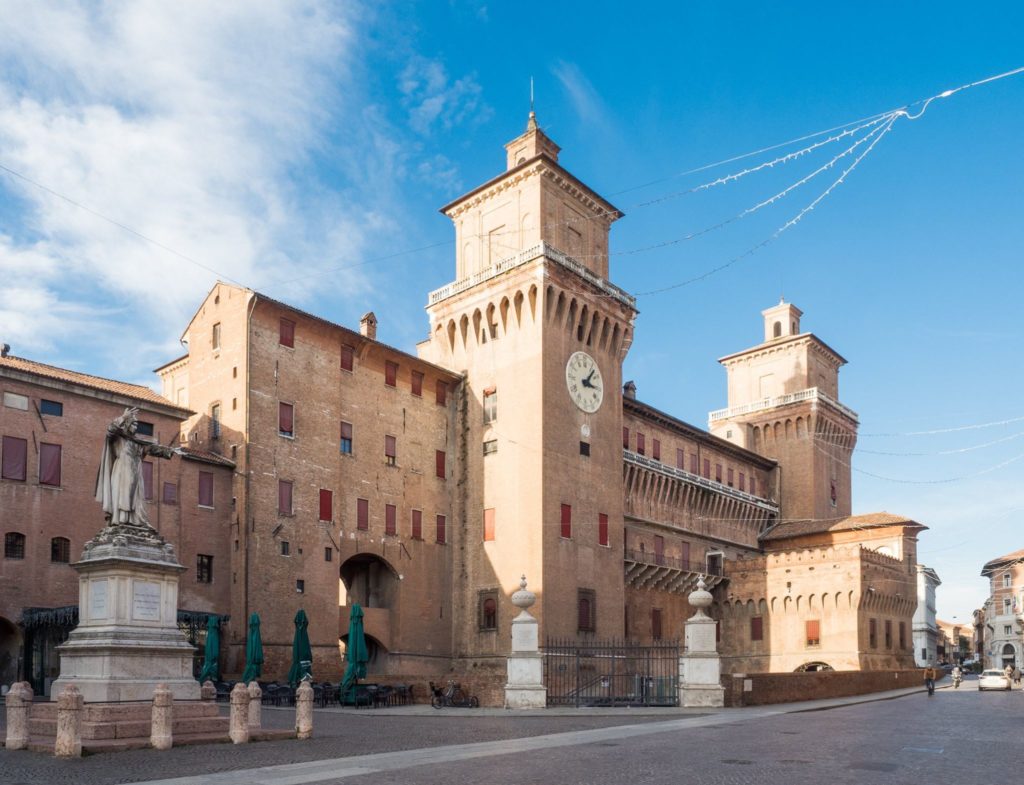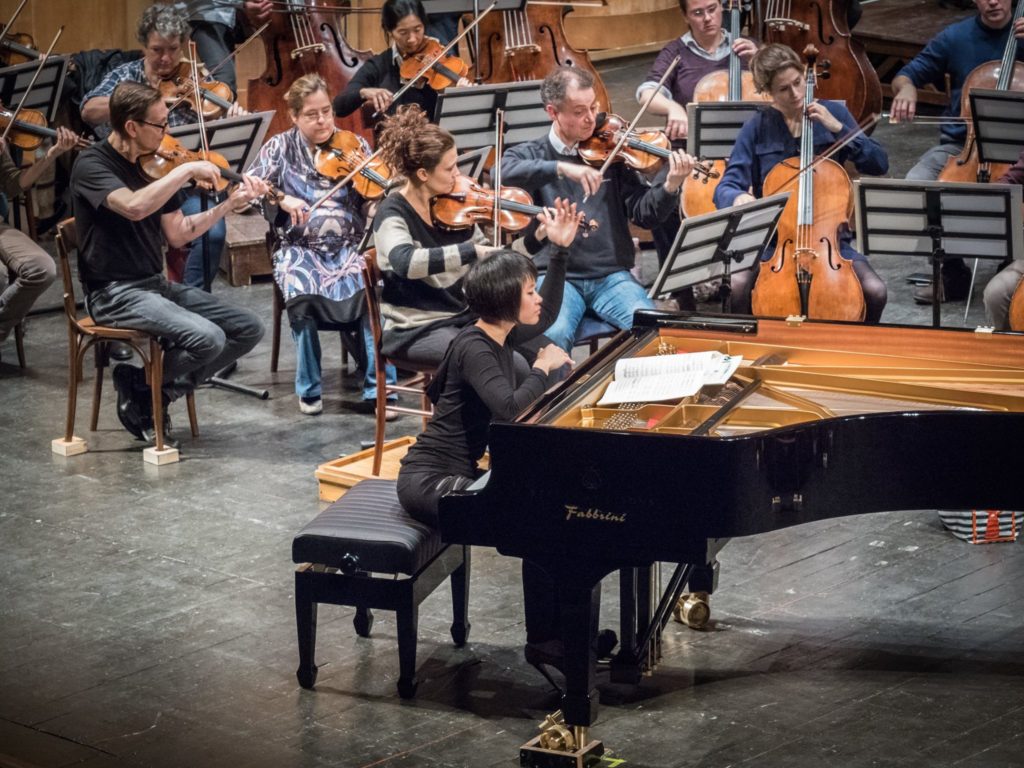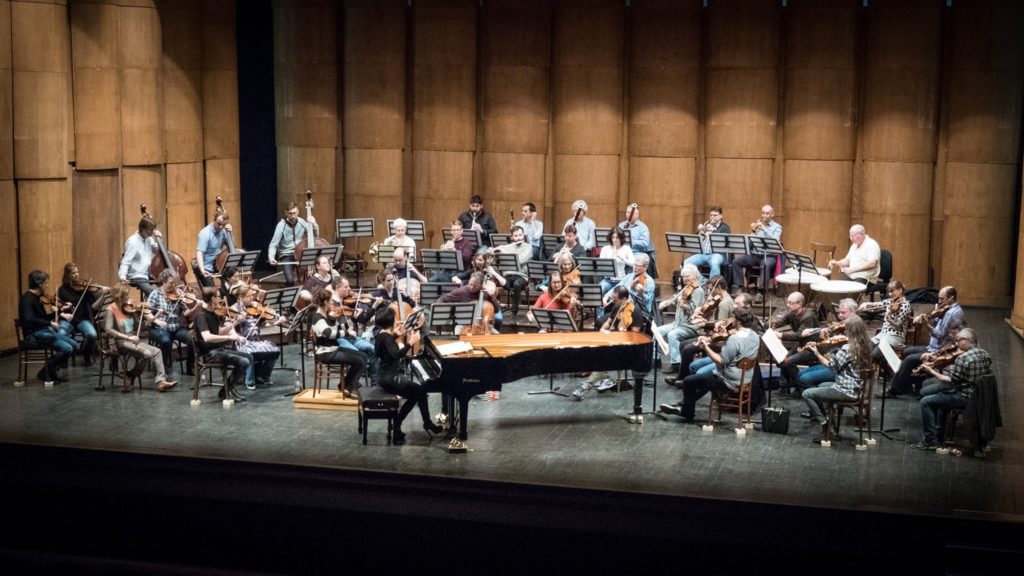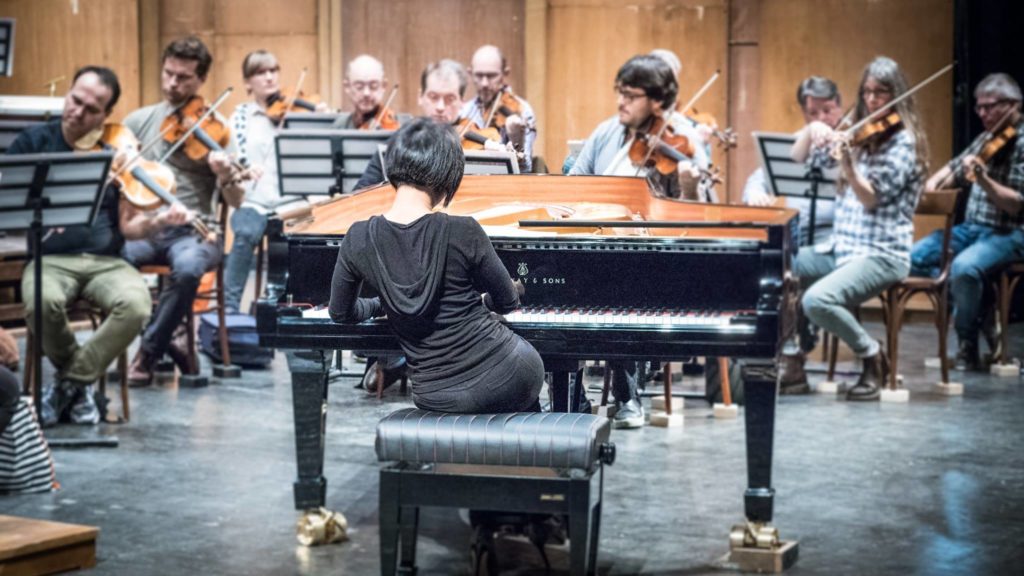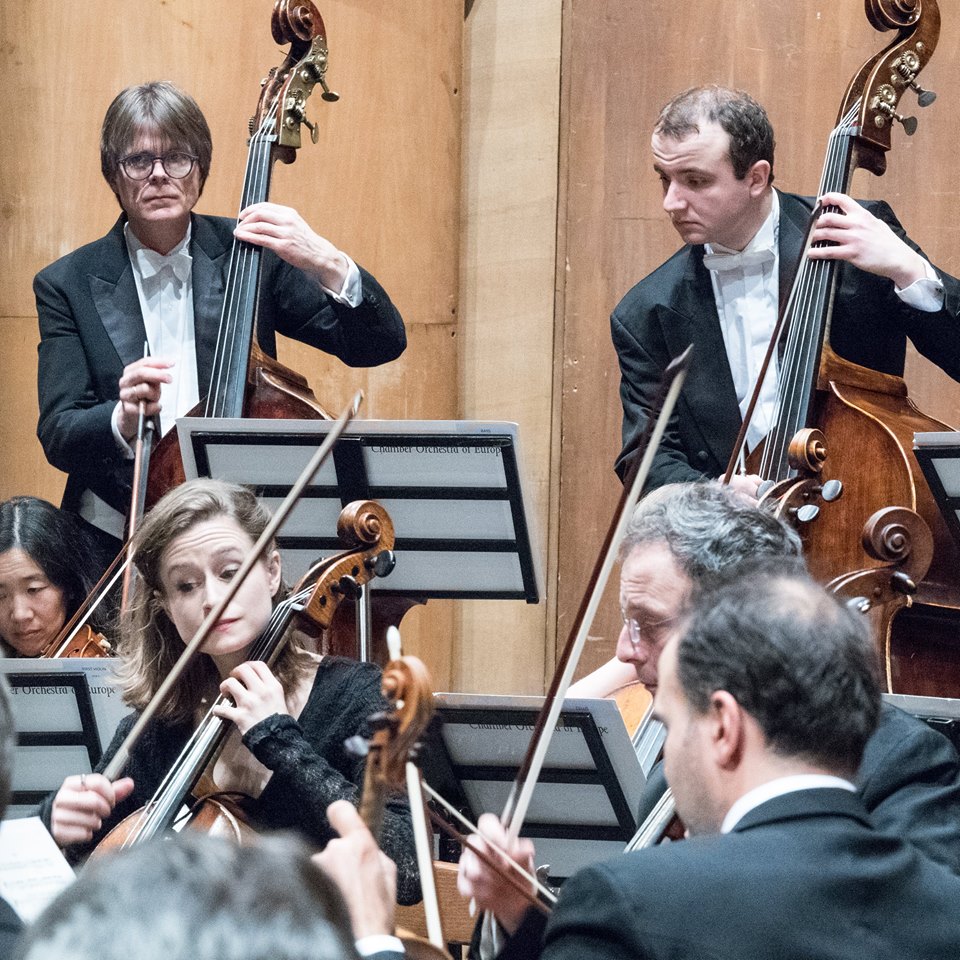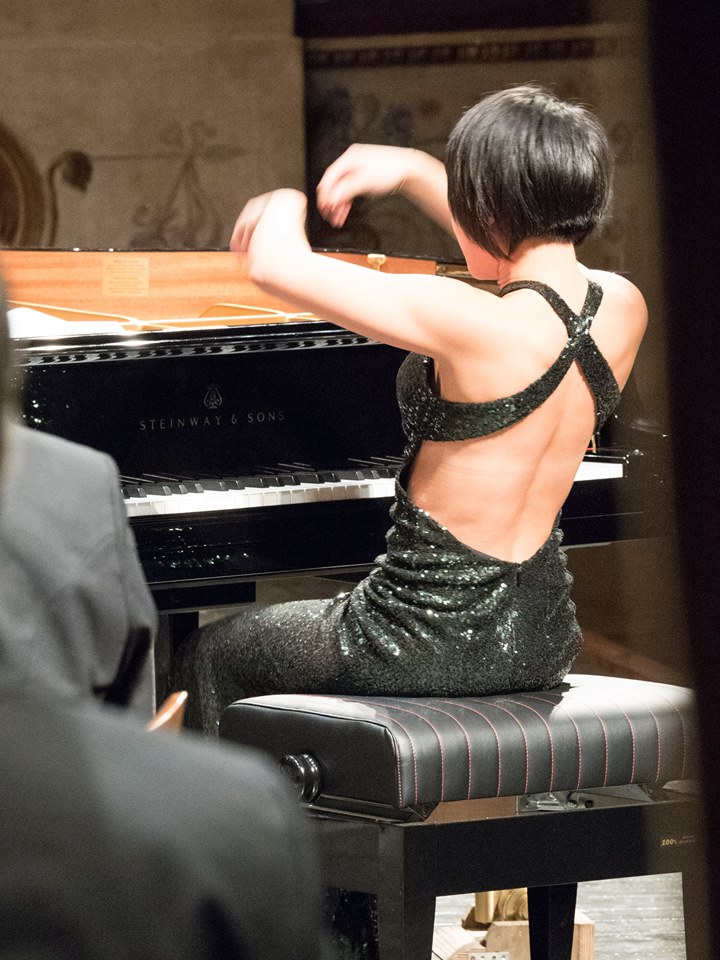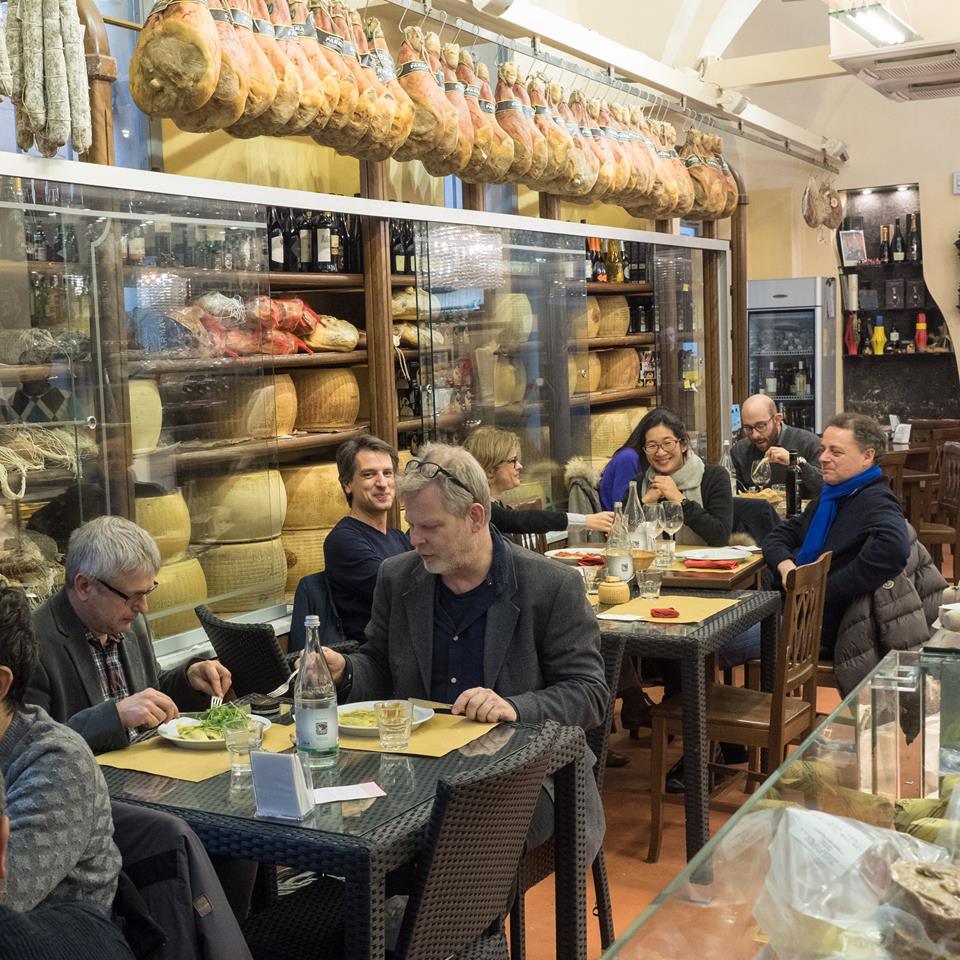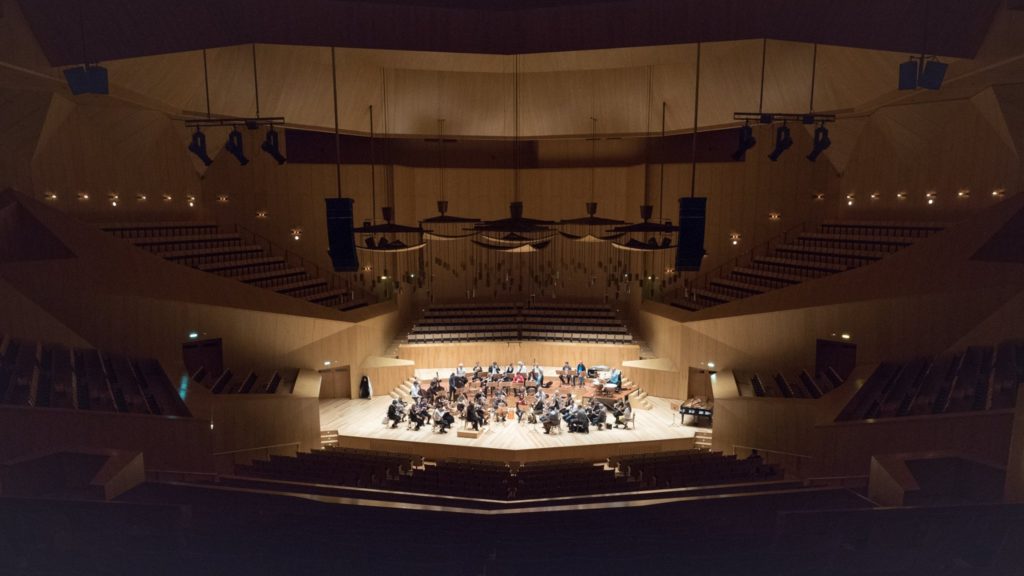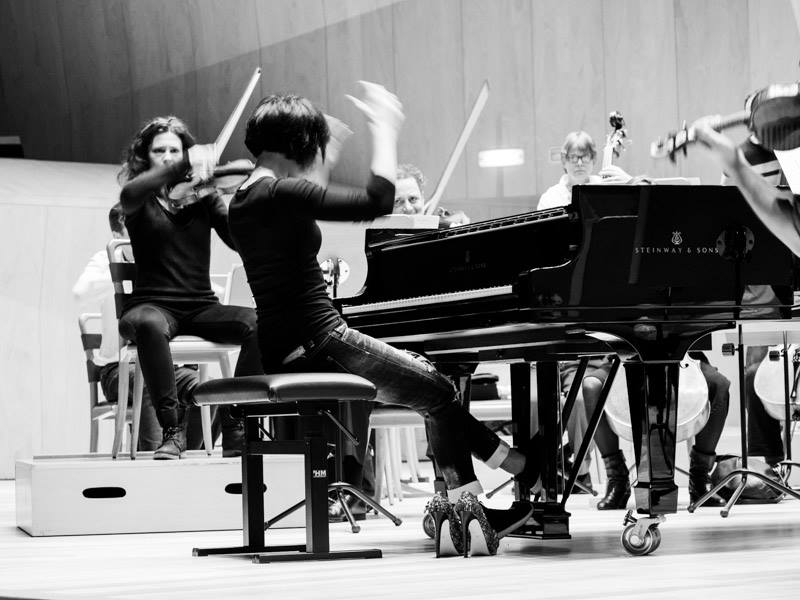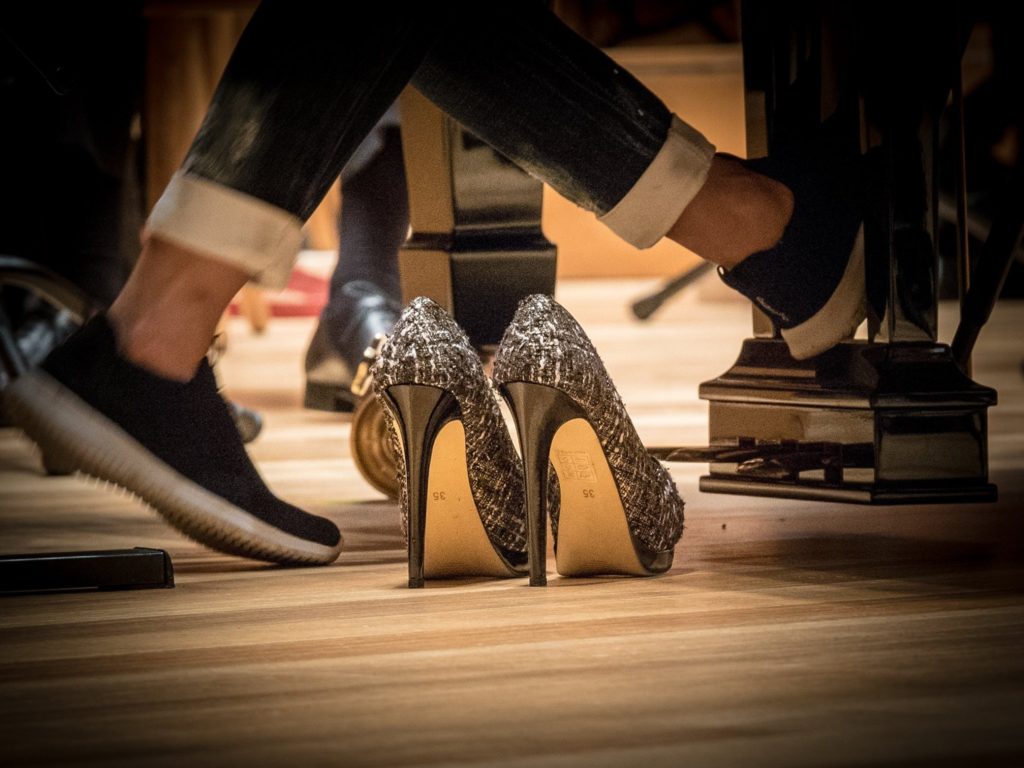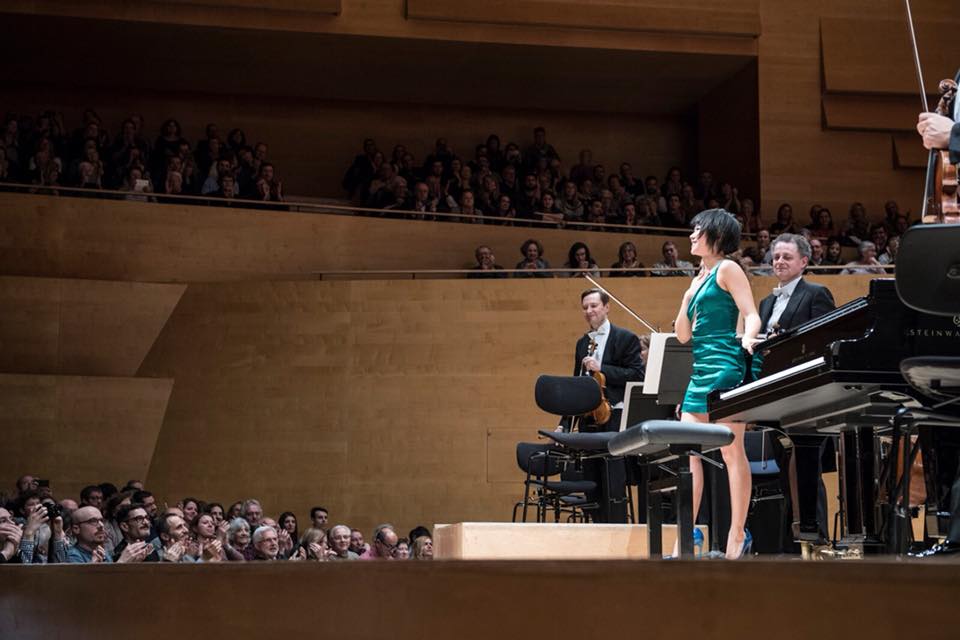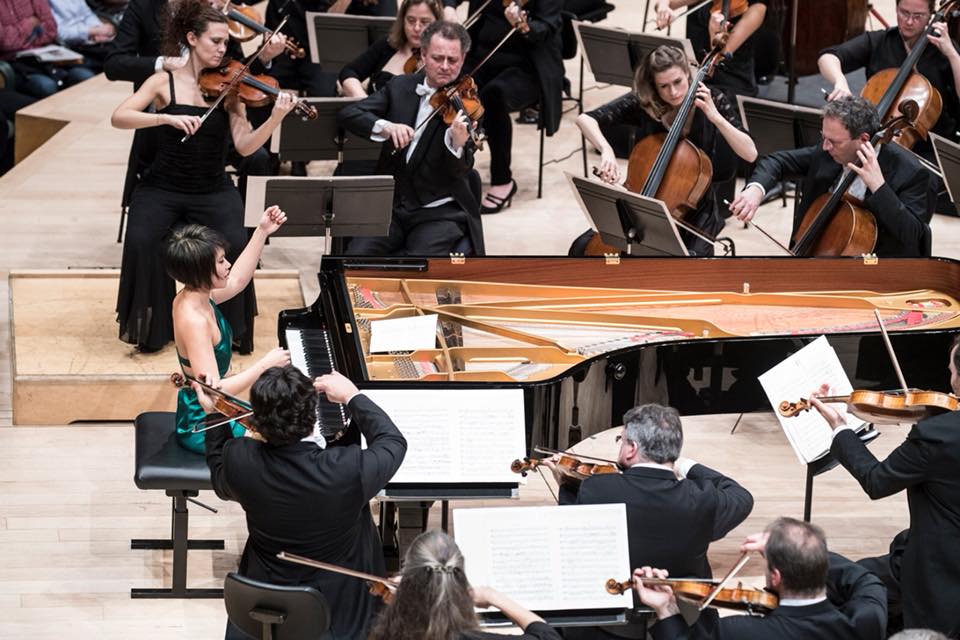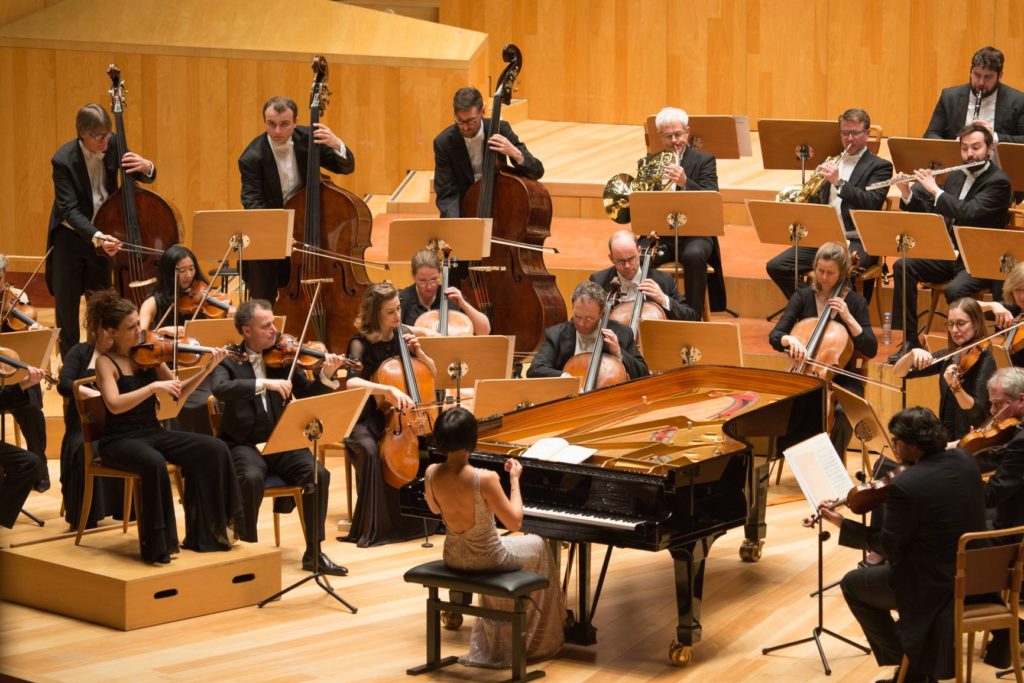The COE and Yuja Wang
8-21 January 2018
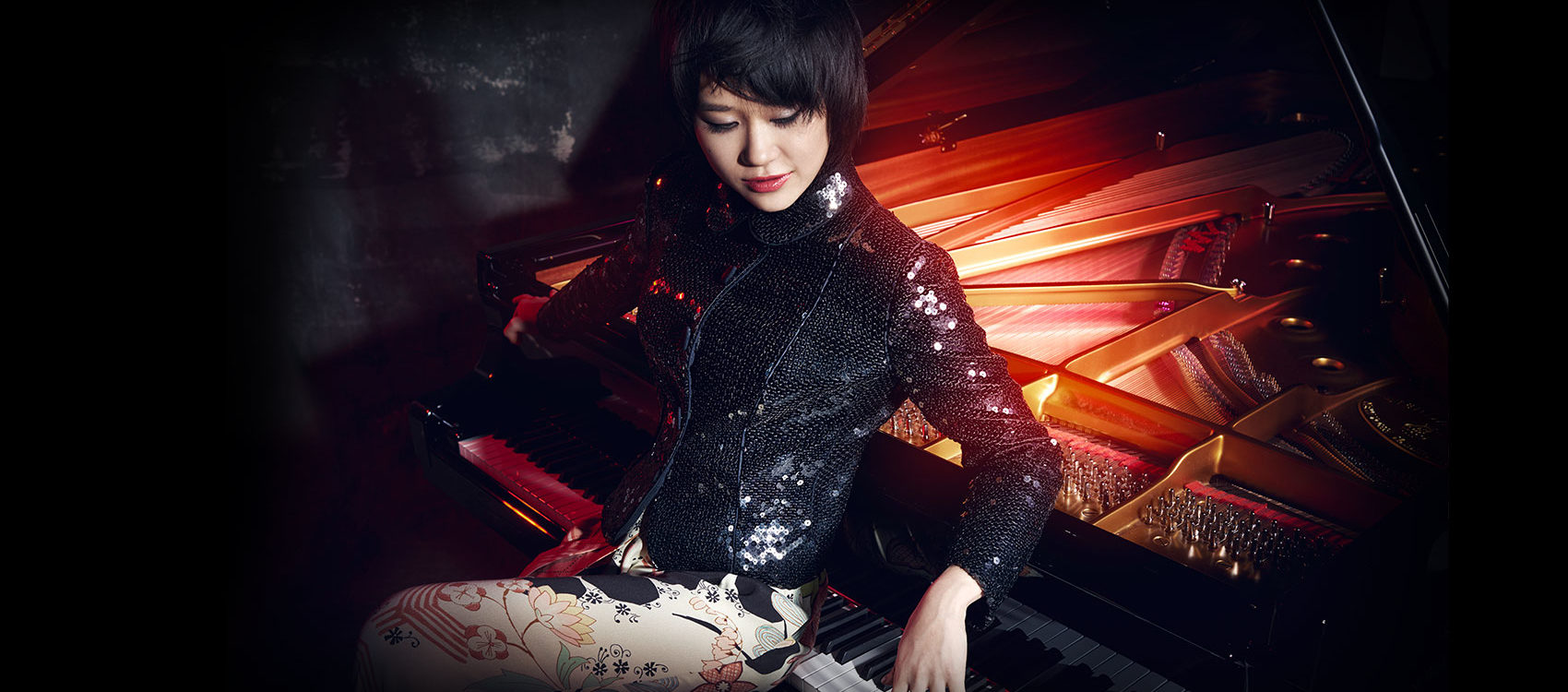
Introduction
From 8 to 20 January, the Chamber Orchestra of Europe is joined for the first time by the outstanding Chinese pianist Yuja Wang who will perform and direct Beethoven’s Piano Concerto No. 1 and Chopin’s Andante Spianato and Grande Polonaise Brillante in Ferrara, Brescia, Reggio Emilia, San Sebastian, Bilbao, Pamplona, Zaragoza and Barcelona.
An orchestral performance without a conductor creates a special energy between the musicians and always heightens the senses as everyone takes on more responsibility. To collaborate with Yuja in this context, for her to be at the heart of the COE with her singular blend of technical prowess, keen musical insight, and emotional depth will be particularly inspiring and we look forward to connect to her charismatic and heartfelt way of making music.
Our tour programme also includes Mendelssohn’s Fair Melusina Overture and a suite of movements from A Midsummer Night’s Dream directed by COE Leader Lorenza Borrani. Her outstanding musicality and skills have attracted unanimous praise internationally from her first performances as COE Leader in 2008. Notably last May when directing the Orchestra with soloist Piotr Anderszewski, the press commented: “Not only were Bela Bartok’s demanding rhythms and many musical shades perfectly controlled from the Leader’s stand, but also all of the tutti passages in both concertos, which seem to naturally unravel themselves.” (Frankfurter Rundschau)
“One was blown away by the strings of this top-quality orchestra, led by their fabulous concert-master Lorenza Borrani.” (Neumarkter Nachrichten)
The programme of all eight concerts features:
Mendelssohn – Das Märchen von der schönen Melusine, Overture op. 32 (directed by Lorenza Borrani)
Beethoven – Piano Concerto No. 1 in C op. 15 (directed by Yuja Wang)
Mendelssohn – A Midsummernight’s Dream Suite (directed by Lorenza Borrani)
Chopin – Andante spianato and Grande Polonaise brillante op. 22 (directed by Yuja Wang)
The artists will perform at Ferrara on 11th January, Brescia on the 12th, Reggio Emilia on the 13th, San Sebastian on the 15th, Bilbao on the 16th, Pamplona on the 17th, Zaragoza on the 18th and Barcelona on the 20th. For tickets, please click here.
To watch the video of the Facebook Live event organised by the newspaper La Vanguardia in Barcelona on 20 January, please click here.
Gallery
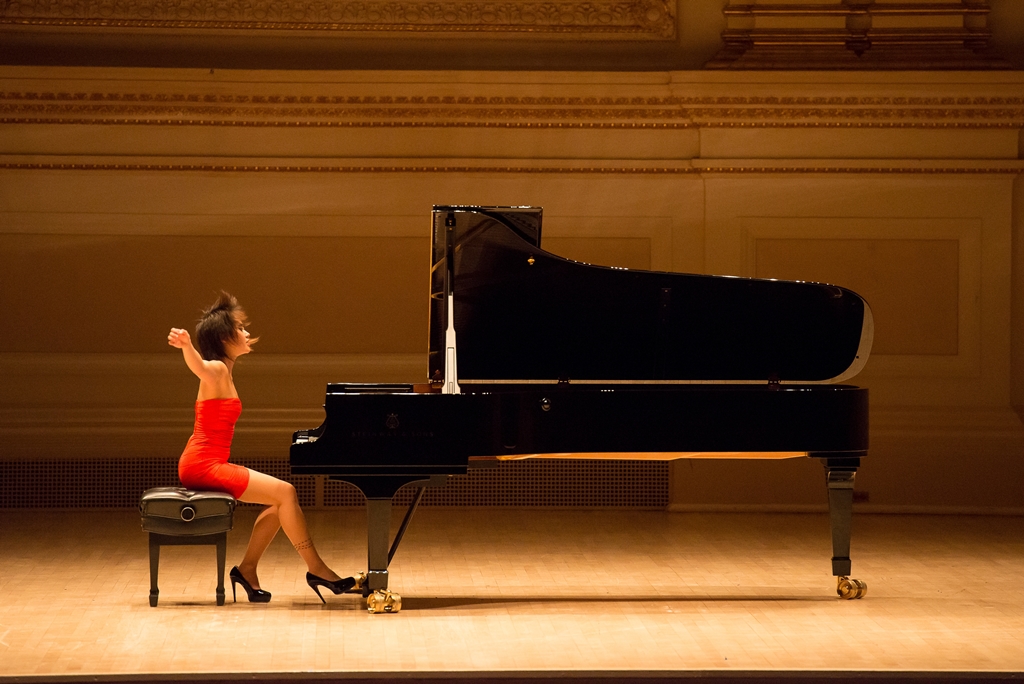
Yuja Wang
Yuja Wang was born in Beijing and encouraged to make music at a young age by her dancer mother and percussionist father, which served as the catalyst for the never-ending thirst for knowledge that has sustained her continued musical development.
She began piano lessons at the age of six, and her progress was accelerated by studies at Beijing’s Central Conservatory of Music. In 1999 she moved to Canada to participate in the Morningside Music summer programme at Calgary’s Mount Royal College, and thereafter enrolled as the youngest ever student at Mount Royal Conservatory. Wang’s exceptional gifts were widely recognised in 2001 with her appointment as a Steinway Artist, and again the following year when she was offered a place at Philadelphia’s prestigious Curtis Institute of Music, where she studied with Gary Graffman.
By the time Yuja graduated from Curtis in 2008, she had already gained momentum following the spectacular success of her debut three years earlier with the National Arts Center Orchestra in Ottawa. Wang attracted widespread international attention in March 2007 when she replaced Martha Argerich on short notice in performances of Tchaikovsky’s Piano Concerto No.1 with the Boston Symphony Orchestra, and within the span of just a few seasons she was working with conductors of the highest calibre. Over the past decade of her career, she has worked with such pre-eminent Maestros as Claudio Abbado, Daniel Barenboim, Gustavo Dudamel, Valery Gergiev, Michael Tilson Thomas, Antonio Pappano, Charles Dutoit, and Zubin Mehta.
In January 2009, Yuja Wang became an exclusive Deutsche Grammophon recording artist. Her debut album, Sonatas & Etudes, prompted Gramophone to name her as its 2009 Young Artist of the Year. Her 2011 release of Rachmaninov’s Second Piano Concerto and Paganini’s Rhapsody with the Mahler Chamber Orchestra and Claudio Abbado was nominated for a Grammy® Award in the Best Classical Instrumental Solo category. Subsequent releases for the label include Fantasia, an album of encore pieces by Albéniz, Bach, Chopin, Rachmaninov, Saint-Saëns, Scriabin, and others; a live recording of Prokofiev’s Concertos Nos. 2 and 3 with Gustavo Dudamel and the Simón Bolívar Symphony Orchestra, and an acclaimed coupling of Ravel’s two piano concerti with Fauré’s Ballade, recorded with the Tonhalle Orchestra Zurich and Lionel Bringuier.
Reviewers around the world have documented the full range of Wang’s work, capturing the essence of her musicianship and observing the development of an artist blessed with consummate technical abilities, an inexhaustible creative imagination, and an unmatched artistry.
For more information about her 2017-2018 season, please visit http://yujawang.com
Yuja Wang plays Chopin : Waltz in C sharp minor, Opus 64 No. 2
A minute with... Yuja Wang (Medici TV)
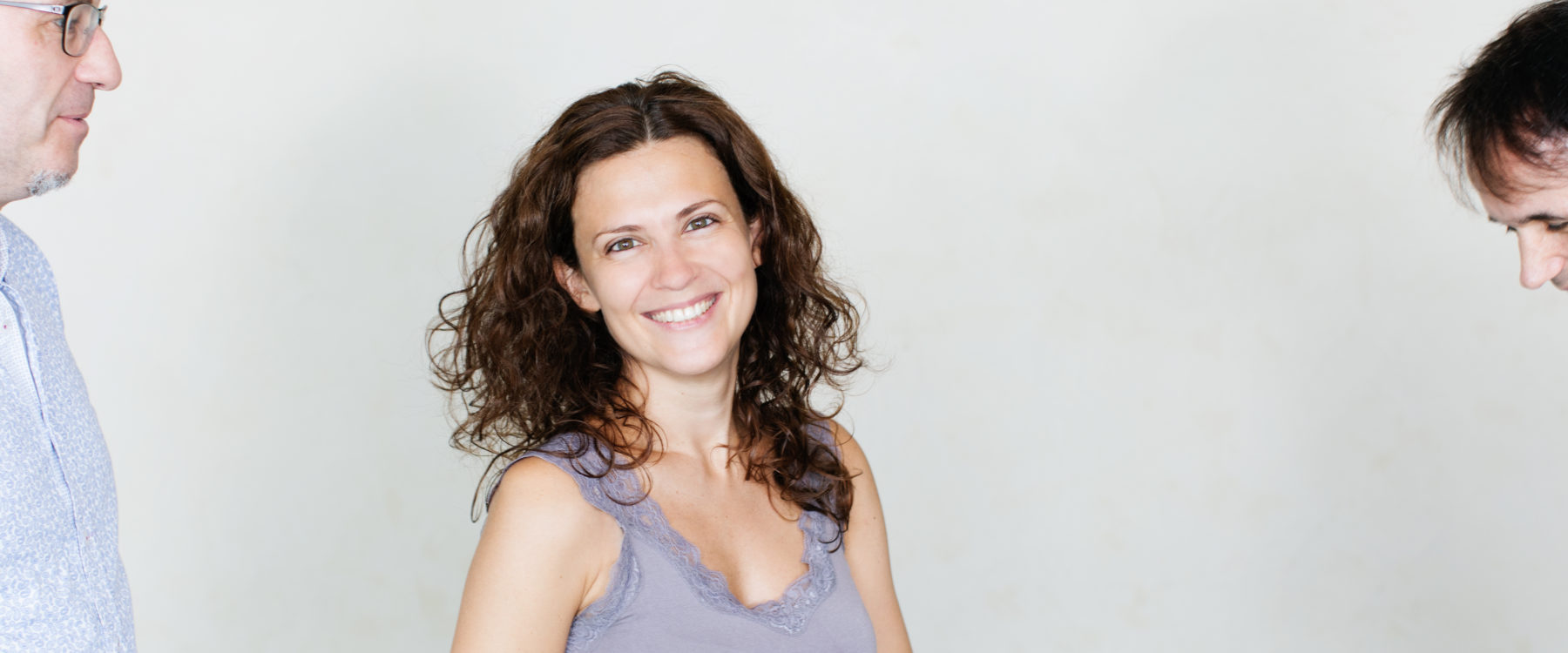
Lorenza Borrani
Lorenza Borrani has been Leader of the Chamber Orchestra of Europe since 2008. She also performs as Leader, director, soloist and chamber musician in Europe and the world’s major concert halls and festivals – including the Berlin Philharmonie (Berlin’s Musikfest), the Edinburgh Festival, the Cologne Philharmonie, the Paris Philharmonie, the Aldeburgh Festival, Amsterdam’s Concertgebouw and Sydney’s Opera House.
Lorenza was a member of Orchestra Mozart from 2005 to 2008 and, in November 2006, under Claudio Abbado, she performed the rarely played Violin Concerto No. 7 by Mozart at the Teatro Comunale in Ferrara.
She has been Leader of Symphonica Toscanini (Lorin Maazel) since 2003 and has won several national and international prizes.
Born in Florence in 1983, Lorenza started studying the violin at age 5 at the Scuola di Musica di Fiesole with Alina Company, Piero Farulli, Zinaida Gilels and Pavel Vernikov, with whom she performed Bach’s Concerto for 2 Violins for her concert debut in 1995. Lorenza undertook postgraduate studies at the University of Music and Dramatic Arts in Graz, Austria, with Boris Kuschnir and had several masterclasses with Pier Naciso Maso, S. Rostropovich, Ana Chumachenko, Maya Glezarova and Ilya Grubert.
As chamber musician and soloist she has collaborated with conductors Yuri Harohnovich, Gyorgy Gyorivany Rath, Claudio Abbado, Trevor Pinnock, Yannick Nézet-Séguin, Bernard Haitink and took part to many chamber music festivals performing with Isabelle Faust, Helene Grimaud, Daniel Hope, David Finkler (Emmerson Quartet), Sir András Shiff, Pierre-Laurent Aimard, Irina Schnittke, Tabea Zimmermann, Mario Brunello, Christan Tetzlaff, Alexander Lonquich, L. Zilberstein, Pavel Gililov, Janine Jansen. She is one of the founders of the “Spira mirabilis” project and is a Professor of Violin at the Scuola di Musica di Fiesole (Florence).
Lorenza plays a Santo Serafino (Venice, 1745).
"Mon coeur s'ouvre à ta voix" (Saint-Saëns) by Lorenza Borrani and COE players
Lorenza Borrani leading Beethoven's Symphony No. 6 'Pastoral' with Yannick Nézet-Séguin (Paris, February 2017)
Reviews
The Chamber Orchestra of Europe’s eight-concert tour with Yuja Wang was a great success and we are delighted that this collaboration will result in more projects together in the future.
In Barcelona, the last city of the tour, the newspaper La Vanguardia organised a ‘Facebook Live’ event featuring a few minutes of rehearsal followed by an interview with Yuja Wang and the COE Leader Lorenza Borrani (Please click here to watch the video). When asked about her first experience with the COE, Yuja said: “Beside being such amazing, exquisite musicians, they are also so heart-warming as human beings! I’m having a great time! It’s my first time with the COE and we are already talking about our next projects in different countries. It’s just the feeling of how much they intensely listen all the time and their reaction in the concert, the creativity that only happens in the moment… It’s really magical and it made me love the pieces more. This is amazing musicianship and the way we play like chamber music is just a joy.”
This ‘chamber music’ aspect was picked up in Platea Magazine where a reviewer who was at the concert in Zaragoza said that the Chamber Orchestra of Europe provided “a true epitome of what it is to play chamber music. This is nothing more than the art of listening, an attitude which should in fact be applied to any musical interpretation, whether or not it is chamber music.” (Platea Magazine, 22/01/2018) According to this reviewer, one could clearly hear the influences of Nikolaus Harnoncourt and Claudio Abbado in the Mendelssohn pieces performed by the Orchestra, whose sound he described as “compact and silky, always refined and serene but vibrant”. El Pais also highlighted Harnoncourt’s and Abbado’s influences on the COE: “The Chamber Orchestra of Europe, which maintains that musical excellence that was forged by Abbado and Harnoncourt, opened the concert with an exceptional version of the overture La bella Melusina, by Mendelssohn.(…) It was chamber music on a large scale.” (El Pais, 19/01/2018). El Diario Vasco in San Sebastian used superlatives to describe the Orchestra’s performance in the Mendelssohn: “the indisputable artistic quality of the Chamber Orchestra of Europe, an ensemble that confirms our conviction that a good orchestra is one that performs all music as if it were chamber music. (…) One only needs to hear the first few bars of the Overture by Mendelssohn to know that one is listening to an incredible ensemble. The Chamber Orchestra of Europe didn’t need more than a magnificent Leader to unify almost fifty musicians in one unique sound and timbre. (…) It was as if all the musicians in the orchestra breathed, understood and felt the music in the same way.” (16/01/2018)
Several critics also singled out the COE’s principal clarinet Romain Guyot’s “excellent work” (Platea Magazine, 22/01/2018) and “magnificent solos” (El Pais, 19/01/2018).
